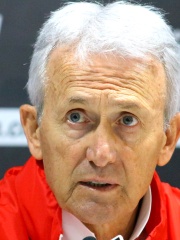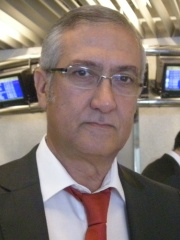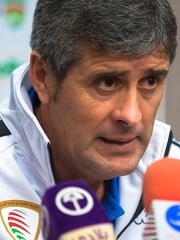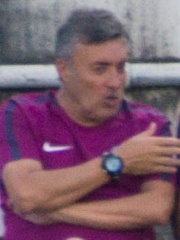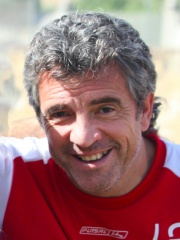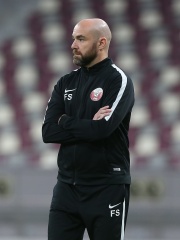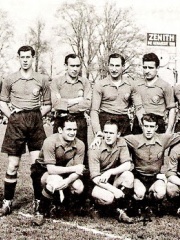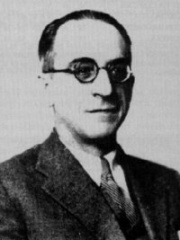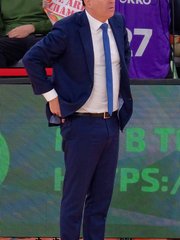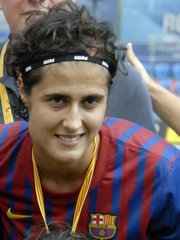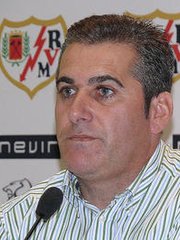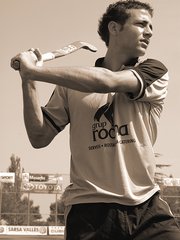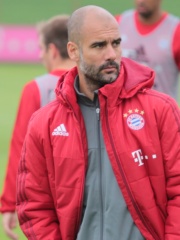
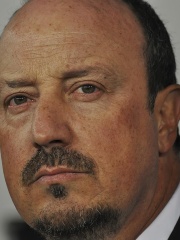
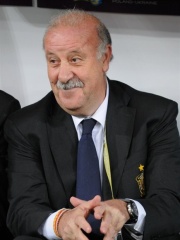
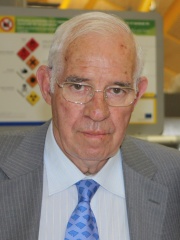

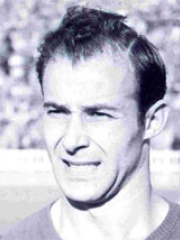
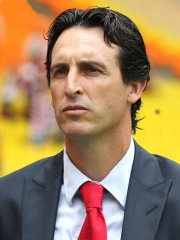

The Most Famous
COACHES from Spain
This page contains a list of the greatest Spanish Coaches. The pantheon dataset contains 471 Coaches, 39 of which were born in Spain. This makes Spain the birth place of the 4th most number of Coaches behind United Kingdom, and Italy.
Top 10
The following people are considered by Pantheon to be the top 10 most legendary Spanish Coaches of all time. This list of famous Spanish Coaches is sorted by HPI (Historical Popularity Index), a metric that aggregates information on a biography's online popularity. Visit the rankings page to view the entire list of Spanish Coaches.

1. Pep Guardiola (b. 1971)
With an HPI of 77.30, Pep Guardiola is the most famous Spanish Coach. His biography has been translated into 81 different languages on wikipedia.
Josep "Pep" Guardiola Sala (Catalan pronunciation: [ˈpɛb ɡwəɾðiˈɔlə]; born 18 January 1971) is a Catalan football manager and former player from Spain who is the manager of Premier League club Manchester City. Guardiola is one of two managers in history to win the continental treble twice and he holds the record for the most consecutive league games won in La Liga, Bundesliga, and the Premier League. He is widely regarded as one of the greatest managers of all time. Guardiola was a defensive midfielder who usually played in a deep-lying playmaker's role. He spent the majority of his career with Barcelona, forming a part of Johan Cruyff's Dream Team that won the club's first European Cup in 1992, and four successive Spanish league titles from 1991 to 1994. He captained the team from 1997 until his departure from Barcelona in 2001. Guardiola then had stints with Brescia and Roma in Italy, Al-Ahli in Qatar and Dorados in Mexico. He was capped 47 times for the Spanish national team and appeared at the 1994 FIFA World Cup, as well as at UEFA Euro 2000. He also played friendly matches for Catalonia. After retiring as a player, Guardiola briefly managed Barcelona B and won the Tercera División title before taking charge of the first team in 2008. In his first season, Guardiola led Barcelona to the continental treble of La Liga, the Copa del Rey and the UEFA Champions League, becoming the youngest manager to win the latter competition. He was named the FIFA World Coach of the Year in 2011 after leading the club to another La Liga and Champions League double in the 2010–11 season. Guardiola ended his four-year Barcelona stint in 2012 with 14 honours, a club record. Guardiola joined Bayern Munich in 2013 and won the Bundesliga in each of the three seasons, including two domestic doubles. He left the club for Manchester City in 2016 and has since won six Premier League titles, including four successive wins from 2019 to 2024, marking the first time in the history of the English top flight that a team has done so. His first title in his second season in charge broke numerous domestic records as the team became the first to attain 100 points in a single season. He also led City to a domestic treble in 2018–19. Guardiola guided City to their first Champions League final in 2020–21, and their first Champions League title as part of his second continental treble in 2022–23. He is the club's second-longest serving manager.

2. Rafael Benítez (b. 1960)
With an HPI of 75.12, Rafael Benítez is the 2nd most famous Spanish Coach. His biography has been translated into 52 different languages.
Rafael Benítez Maudes (born 16 April 1960) is a Spanish professional football manager and former player. He is currently the head coach of Super League Greece club Panathinaikos. Benítez joined Real Madrid's coaching staff at the age of 26, going on to work as the under-19 and reserve team coach, and assistant manager for the senior team. He moved away from Real Madrid in 1995, but management spells at Real Valladolid and Osasuna were short-lived and unsuccessful. He guided Segunda División club Extremadura back to La Liga in his first season in the 1997–98 season, but the team was relegated the following season. He left the club, and coached Tenerife in 2000, winning promotion in his only season. Benítez was appointed coach of Valencia and won La Liga in the 2001–02 and 2003–04 seasons, with the UEFA Cup alongside the latter. After leaving Valencia, Benitez moved to English club Liverpool of the Premier League, guiding the club to victory in the UEFA Champions League in 2005. For the second consecutive season, he was named UEFA Manager of the Year. He also won the FA Cup in 2006 and reached the 2007 Champions League final, but was unable to win the Premier League, with Liverpool's best league performance under Benítez a second-place finish in 2008–09. After leaving Liverpool in June 2010, Benítez was appointed manager of treble-winning side Inter Milan. Despite attaining silverware with the Supercoppa Italiana and Club World Cup, his reign at the club was short, and he was dismissed midway through the 2010–11 season. In November 2012, he was appointed interim manager of Chelsea for the remainder of the season, and he went on to win the 2013 Europa League. He returned to Italy in 2013 to coach Napoli, where he won the Coppa Italia and Supercoppa Italiana. He then left Napoli and became coach of Real Madrid in June 2015 on an initial three-year contract, lasting six months. Benítez was appointed manager of Newcastle United in March 2016. He was unable to avoid relegation, but earned promotion back to the Premier League by winning the Championship. He left the club in June 2019, and joined Chinese Super League club Dalian Professional. He left the club by mutual consent in January 2021, before taking over as manager at Everton in June. He was dismissed in January 2022, and then managed Celta Vigo in 2023–24.

3. Vicente del Bosque (b. 1950)
With an HPI of 74.89, Vicente del Bosque is the 3rd most famous Spanish Coach. His biography has been translated into 54 different languages.
Vicente del Bosque González, 1st Marquess of Del Bosque (Spanish pronunciation: [biˈθente ðel ˈβoske ɣonˈθaleθ]; born 23 December 1950) is a Spanish retired football manager and former player. He is regarded as one of the greatest managers of all time and is to date the only football manager to have won the World Cup, the Champions League, the European Championship and the Intercontinental Cup. After taking over from Luis Aragonés – who had led Spain to European success at UEFA Euro 2008 – del Bosque went on to lead the national team to win their first-ever FIFA World Cup in 2010, and then to retain their European Championship in 2012. Del Bosque coached Real Madrid from 1999 to 2003, which was one of the most successful periods in the club's modern era. During his playing career, del Bosque made over 400 appearances for Real Madrid, winning five La Liga titles and four Copas del Rey. He played internationally with the senior Spain national team on 18 occasions.

4. Luis Aragonés (1938 - 2014)
With an HPI of 74.00, Luis Aragonés is the 4th most famous Spanish Coach. His biography has been translated into 53 different languages.
Luis Aragonés Suárez (Spanish pronunciation: [ˈlwis aɾaɣoˈnes ˈswaɾeθ]; 28 July 1938 – 1 February 2014) was a Spanish football player and manager. Aragonés spent the majority of his career as a player and coach at Atlético Madrid. He was a prominent player and then coach of the successful Atlético team of the late 1960s and early 1970s. The team were national champions four times, reached the 1974 European Cup Final. Between 1964 and 1974, he played 265 Primera Liga games for Atlético and scored 123 goals. He also played for several other clubs, including Real Madrid, and played 11 times for Spain, scoring three goals. Apart from Atlético he also coached seven other La Liga clubs as well as the Spain national team, whom he led to their second European Championship title in 2008. He then became the head coach of the Turkish club Fenerbahçe after the tournament, the only time he coached outside his native Spain.
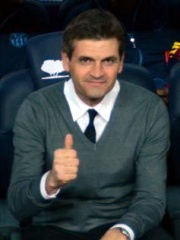
5. Tito Vilanova (1968 - 2014)
With an HPI of 69.02, Tito Vilanova is the 5th most famous Spanish Coach. His biography has been translated into 55 different languages.
Francesc "Tito" Vilanova Bayó (17 September 1968 – 25 April 2014) was a Spanish professional football central midfielder and manager. After a career which consisted of a total of 26 La Liga matches in three seasons, all with Celta, he went on to work with Barcelona as an assistant coach under Pep Guardiola, being part of the squad that had won 14 titles. Vilanova was appointed as first-team manager in 2012, winning La Liga in his only season. He stepped down in July 2013 due to ill health, and died the next year from throat cancer.

6. Luis de la Fuente (b. 1961)
With an HPI of 68.89, Luis de la Fuente is the 6th most famous Spanish Coach. His biography has been translated into 39 different languages.
Luis de la Fuente Castillo (born 21 June 1961) is a Spanish football manager and former professional player who played as a left-back. He is the manager of the Spain national team. He amassed La Liga totals of 254 matches and six goals over 13 seasons, with Athletic Bilbao and Sevilla, winning two league titles with the former including a double with the Copa del Rey in 1984. De la Fuente began working in the Spanish youth teams in 2013, managing the under-19 team to victory in the 2015 European Championship and the under-21 side to the 2019 equivalent. He coached the Olympic team to the silver medal at the 2020 games, and took over at the seniors in 2022, winning the 2023 Nations League and Euro 2024.

7. César Rodríguez Álvarez (1920 - 1995)
With an HPI of 67.71, César Rodríguez Álvarez is the 7th most famous Spanish Coach. His biography has been translated into 29 different languages.
César Rodríguez Álvarez (6 July 1920 – 1 March 1995), sometimes known as just César, was a Spanish football forward and manager. During his career, which spanned more than two decades, he played mainly for Barcelona, appearing in 351 official matches and scoring 232 goals (previously counted as 235), making him the highest goalscorer in the club's history for several decades, until he was passed by Lionel Messi. He won five La Liga championships with the team in a total of 13 major trophies, and was renowned for his ability to score from corners. César represented Spain at the 1950 World Cup. After retiring, he managed both Zaragoza and Barcelona amongst several other professional teams.

8. Unai Emery (b. 1971)
With an HPI of 65.81, Unai Emery is the 8th most famous Spanish Coach. His biography has been translated into 53 different languages.
Unai Emery Etxegoien (born 3 November 1971) is a Spanish football manager and former player who is the head coach of Premier League club Aston Villa. He is widely regarded as one of the best managers in the world. Since 2021, he is also the majority shareholder of fourth-tier Spanish club Real Unión. After a career spent playing mostly in Spain's Segunda División, Emery transitioned into coaching after retiring in 2004. He began at Lorca Deportiva, where he achieved promotion to the Segunda División in his first season. He then joined Almería, whom he led to promotion to La Liga for the first time in the club's history. He subsequently moved to Valencia, leading the team to top-three finishes. After his contract was not renewed at Valencia, he moved to Spartak Moscow for six months but was sacked due to poor performance, before moving to Sevilla in 2013, where he won an unprecedented three consecutive Europa Leagues. Emery moved to French club Paris Saint-Germain in 2016. There, he won a Ligue 1 title, two Coupe de France titles, two Coupe de la Ligues, and two Trophée des Champions, including a domestic quadruple in his second season. After the expiry of his contract, Emery was appointed as head coach of English club Arsenal in 2018, succeeding Arsène Wenger. He finished Europa League runner-up in his first season, before being dismissed in November 2019. He was hired by Villarreal in July 2020, where he won the Europa League in his first season and guided the club to a Champions League semi-final run in the following season. In October 2022, he returned to the Premier League to manage Aston Villa and guided them to a UEFA Conference League semi-final in 2024 and the Champions League quarter-finals a year later after successfully finishing in the top four of the Premier League.

9. José Villalonga (1919 - 1973)
With an HPI of 65.65, José Villalonga is the 9th most famous Spanish Coach. His biography has been translated into 27 different languages.
José "Pepe" Villalonga Llorente (12 December 1919 – 7 August 1973) was a Spanish football manager during the 1950s and 1960s. He coached Real Madrid, Atlético Madrid, and the Spain national team, winning major trophies with all three.
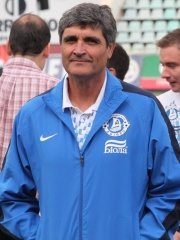
10. Juande Ramos (b. 1954)
With an HPI of 63.27, Juande Ramos is the 10th most famous Spanish Coach. His biography has been translated into 38 different languages.
Juan de la Cruz "Juande" Ramos Cano (born 25 September 1954) is a former Spanish footballer and manager. After playing and managing at an amateur level, Ramos led Rayo Vallecano to promotion to La Liga, followed by reaching the quarter-finals of the UEFA Cup in 2001. After brief spells in La Liga at Real Betis, Espanyol and Málaga, he took over at Sevilla in 2005. In two years at the club, he won the UEFA Cup on two occasions, as well as the UEFA Super Cup in 2006, and also winning the Copa del Rey and Supercopa de España. Ramos had a brief spell in England's Premier League, winning the Football League Cup at Tottenham Hotspur in 2008. He then managed Real Madrid, CSKA Moscow, Dnipro and Málaga again.
People
Pantheon has 39 people classified as Spanish coaches born between 1887 and 1983. Of these 39, 31 (79.49%) of them are still alive today. The most famous living Spanish coaches include Pep Guardiola, Rafael Benítez, and Vicente del Bosque. The most famous deceased Spanish coaches include Luis Aragonés, Tito Vilanova, and César Rodríguez Álvarez. As of April 2024, 6 new Spanish coaches have been added to Pantheon including Xavi Pascual, Montse Tomé, and José Ramón Sandoval.
Living Spanish Coaches
Go to all RankingsPep Guardiola
1971 - Present
HPI: 77.30
Rafael Benítez
1960 - Present
HPI: 75.12
Vicente del Bosque
1950 - Present
HPI: 74.89
Luis de la Fuente
1961 - Present
HPI: 68.89
Unai Emery
1971 - Present
HPI: 65.81
Juande Ramos
1954 - Present
HPI: 63.27
Benito Floro
1952 - Present
HPI: 58.60
Gregorio Manzano
1956 - Present
HPI: 56.48
Juan Ramón López Caro
1963 - Present
HPI: 56.26
Domènec Torrent
1962 - Present
HPI: 55.95
Juan Manuel Lillo
1965 - Present
HPI: 55.80
Félix Sánchez Bas
1975 - Present
HPI: 53.97
Deceased Spanish Coaches
Go to all RankingsLuis Aragonés
1938 - 2014
HPI: 74.00
Tito Vilanova
1968 - 2014
HPI: 69.02
César Rodríguez Álvarez
1920 - 1995
HPI: 67.71
José Villalonga
1919 - 1973
HPI: 65.65
Ramón Encinas
1893 - 1967
HPI: 59.38
Amadeo García
1887 - 1947
HPI: 57.55
Baltasar Albéniz
1905 - 1978
HPI: 56.02
José Juncosa
1922 - 2003
HPI: 53.36
Newly Added Spanish Coaches (2025)
Go to all RankingsXavi Pascual
1972 - Present
HPI: 50.79
Montse Tomé
1982 - Present
HPI: 49.17
José Ramón Sandoval
1968 - Present
HPI: 41.84
Bolo
1974 - Present
HPI: 40.60
Fernando Jubero
1974 - Present
HPI: 40.49
Santi Freixa
1983 - Present
HPI: 37.67
Overlapping Lives
Which Coaches were alive at the same time? This visualization shows the lifespans of the 8 most globally memorable Coaches since 1700.

